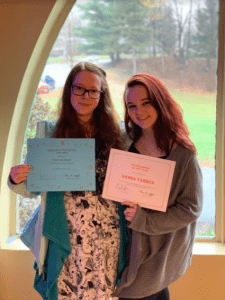
Reporting Sexual Harassment and Assault Under Title IX
Andrea Swiedom Staff Reporter
Title IX is a federal law that protects individuals at federally-funded institutions like UMF from discrimination including sexual harassment and assault as these impede on a person’s participation in education. When students experience sexual harassment and/or assault on campus, they have the option of reporting their case to mandated reporters who include the majority of faculty, staff, certain students employees, volunteers and peer advocates.
“The only people out of this list who are not mandated reporters are the mental health counselors in the Center for Student Development, the UMF Health Center Staff, and Athletic Trainers when they are working in their Athletic Training capacity,” said Hope Shore, Assistant Director of Student Life & Deputy Title IX Coordinator through an email interview.
When a student reports an incident, the mandated reporter must then inform Shore of the incident.
“I will then reach out to the student to see if they would like to meet,” Shore said. “If the student is interested, I will provide them with information about resources, support, campus policies and procedures and available accommodations.”
Students or anyone concerned with an incident may bypass a mandated reporter by filling out the Title IX Incident Reporting Form online located on MyCampus under the Campus Safety tab or through the UMF Title IX website. This online form allows individuals to file their incident anonymously.
Individuals can also report an incident directly to Shore, which is what a group of students did in Dec. 2018 after encountering several occurrences of sexual harassment from the same individual.
The group of students will remain anonymous for their protection as the Flyer staff is aware of their identities and is confident in the credibility of their stories.
The group created a form for everyone involved to fill out and turn into Shore that described their experiences with this individual. One of the students involved expected the incident to be filed under the group’s name. However, even if a case is recorded with a group, each person’s case is treated as an individual report.
Although students have no obligation to go any further once an incident has been brought to Shore’s attention, one of the members of the group that reported the harassment decided to proceed with the Title IX process. “I can back out at any point, but since I knew others were moving forward, I was going to move forward,” they said.
After the group filed their statement, the student met with Shore one-on-one to continue with the process. “I got this big folder of information and she basically told me that she would make the decision on who she would kind of push my case to next and it ended up going to Christine Wilson,” said the student.
They met with Wilson, the Vice President of Student Affairs, to provide yet another statement that would determine whether or not the case would receive a full investigation. “It felt very official, kind of intimidatingly official,” the student said. “I thought I was just meeting with Christine, but when I got there, there was another woman directly connected with Title IX who was just there for recording.”
The student was allowed to bring a person along for support while giving their official statement. “They were not allowed to say anything, but they were allowed to just be there, which I thought was a really nice thing that you can do,” they said.
The incident was warranted a full investigation at the end of January. They were anxious and afraid while awaiting a verdict as they still had to function in classes, school activities and live on campus around the accused individual.
“I don’t want this to last the entire semester. I just wish they had given me a rough timeline. It’s just, you’ll hear from us when you hear from us,” they said.
Shore’s office also provides students with the option to file a No-Contact order, which prohibits the accused from interacting with the accuser until a verdict is reached. However, the No-Contact order has its limitations.
The student described an interaction they had recently in the Student Center with the individual whom they filed the complaint against, while tabling for a club. “He decided to walk right up to the table to start talking to a person next to me. I asked Hope if this breaks the No-Contact order and she said no. I was having a panic attack and I wasn’t able to do anything about it,” they said.
Whether or not students go through with the Title IX process, there are several support resources available on campus that Shore reviews with students during initial meetings. “[Shore] asked me if I knew what services are available. I kind of knew, but at the same time I didn’t,” the student said. “I still said that I knew because I didn’t want to be there, but at the same time, I know that the counselors in Franklin have a month-long waiting list.”
None of the counselors were available for an interview, but students can visit the counseling services website for more information or visit their office on the second floor of Franklin Hall, which is open Monday through Friday from 8 a.m. to 4:30 p.m. The Counseling Center also provides emergency walk-in hours that students may take advantage of at any time.
There is also a confidential, free drop-in support service available in room 112 in the Student Center every Friday from 11 a.m. to 1 p.m. through Sexual Assault Prevention and Response Services (SAPARS). “This is a specific time where an advocate can be accessible to answer questions, be a listening ear, and/or work together with students to engage in awareness raising events and/or other projects,” said Associate Director of SAPARS Shawna Austin in an email interview.
SAPARS isn’t affiliated with UMF, but offers an impressive amount of free and confidential support services, including a 24-hour helpline (1-800-871-7741) to assist anyone affected by sexual harassment and/or assault, support groups, and a Sexual Assault Response Team well-versed in legal procedures that will even accompany individuals to police stations.

